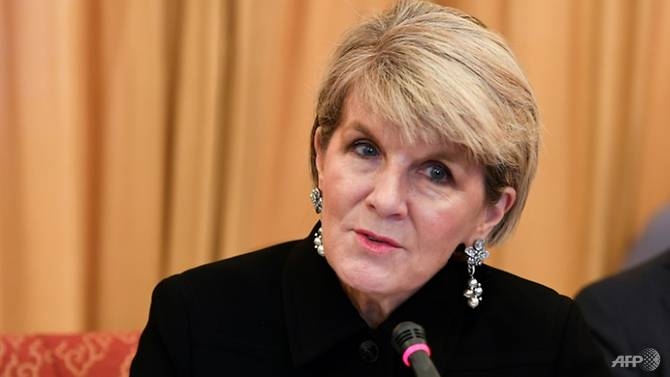Australia vows to compete with China funding in Pacific
 |
| Australian Foreign Minister Julie Bishop said she wanted to ensure neighbouring countries had an alternative option to the often opaque financing from China AFP/Nhac NGUYEN |
Projects are increasingly being constructed in the region through China's signature infrastructure-building Belt and Road Initiative (BRI) and Canberra is worried some small nations may get trapped with unsustainable debts, handing Beijing influence.
Foreign Minister Julie Bishop said she wanted to ensure neighbouring countries had an alternative option to the often opaque financing from China, which Australia says can have unfavourable terms.
"They are sovereign nations," she told the Sydney Morning Herald. "We want to ensure that they retain their sovereignty, that they have sustainable economies and that they are not trapped into unsustainable debt outcomes.
"The trap can then be a debt-for-equity swap and they have lost their sovereignty."
Such swaps have been seen elsewhere in the world including in Sri Lanka, where China took control of a large deep-sea port last year on a 99-year lease after the government was unable to make debt repayments.
They have fuelled fears that China is building a network of strategic assets that could in future be converted to military facilities.
In January, a senior Australian minister called some Chinese infrastructure projects in the Pacific "white elephants" which led to countries taking on debt they couldn't afford.
"What we can do is offer alternative options for countries beyond BRI. BRI is not the only source of infrastructure financing available," Bishop said.
She did not detail exactly what she planned and on what terms, but said she has had discussions with Britain about the possibility of cooperating on projects in the Pacific.
Australia's Lowy Institute think tank said China usually offered "concessional" loans that eventually had to be repaid, while Australia and other traditional donors typically provided one-way grants that did not need to be paid back.
The Institute estimates China provided US$1.78 billion in aid, including concessional loans, to Pacific nations between 2006 and 2016.
Asked whether Australian-led alternatives would be competitive or complementary to what China was doing, Bishop said: "They are both.
"They are complementary in the sense that we recognise that there's a need for infrastructure investment in the Pacific and we're encouraging it, competitive in the sense that we want people to have options - they don't have to only accept one outcome.
"What we don't want is for countries to have no other options ... and Australia should take a very proactive part in that."
According to the International Monetary Fund, Tonga, Samoa and Vanuatu all face considerable debt repayment pressures, and all have significant debt to China.
What the stars mean:
★ Poor ★ ★ Promising ★★★ Good ★★★★ Very good ★★★★★ Exceptional
Related Contents
Latest News
More News
- Russian President congratulates Vietnamese Party leader during phone talks (January 25, 2026 | 09:58)
- Worldwide congratulations underscore confidence in Vietnam’s 14th Party Congress (January 23, 2026 | 09:02)
- Political parties, organisations, int’l friends send congratulations to 14th National Party Congress (January 22, 2026 | 09:33)
- 14th National Party Congress: Japanese media highlight Vietnam’s growth targets (January 21, 2026 | 09:46)
- 14th National Party Congress: Driving force for Vietnam to continue renewal, innovation, breakthroughs (January 21, 2026 | 09:42)
- Vietnam remains spiritual support for progressive forces: Colombian party leader (January 21, 2026 | 08:00)
- Int'l media provides large coverage of 14th National Party Congress's first working day (January 20, 2026 | 09:09)
- Vietnamese firms win top honours at ASEAN Digital Awards (January 16, 2026 | 16:45)
- ASEAN Digital Ministers' Meeting opens in Hanoi (January 15, 2026 | 15:33)
- ASEAN economies move up the global chip value chain (December 09, 2025 | 13:32)

 Tag:
Tag:




















 Mobile Version
Mobile Version